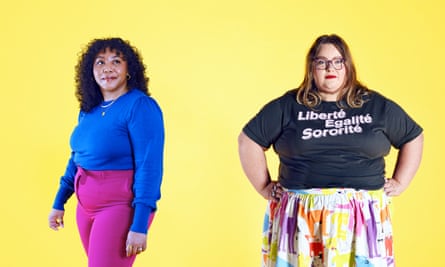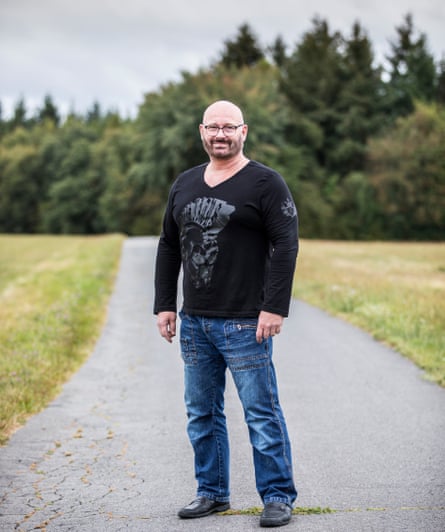Amy Hart earned her 1.2 million Instagram and 99,000 Twitter followers by appearing on 2019’s Love Island, where she had her heart broken while wearing a denim minidress. Like many of the show’s former stars, she is now an influencer: she tells fans where to buy clothes, makeup, even teeth like hers. But on 12 May this year, Hart influenced her followers in an entirely different direction. “Join a union!” the 28-year-old wrote on Twitter, above a 14-second video. “We’re in a really uncertain time when it comes to work and your rights and legislation,” she said. “If I can give you one piece of advice: join a union. They were my absolute saving grace when I was employed by a big company.”
The video went viral, with more than 2,000 retweets and 10,000 likes. A former British Airways flight attendant, Hart says she was motivated by BA’s recent announcement of mass redundancies. Her video struck a chord with young people, who created supportive Karl Marx memes. “People were calling me a socialist icon,” Hart laughs. (She now uses the phrase as her nickname on WhatsApp.)
Hart says Unite – the UK’s second largest trade union, formed in 2007 – was invaluable to her after she joined in 2011. Then 18 and newly employed by BA, the reality star says the union gave her the strength to stand up to bosses who would “try and get you to do stuff you’re not supposed to do”. Just over 6.4 million people in the UK are trade union members (down from a peak of 13 million in the late 70s) and Hart believes unions are more important than ever. She laments that, as an influencer, her job is too “niche” for unionisation.

That’s no longer strictly true. At the end of June, fashion blogger Nicole Ocran, 32, and influencer expert Kat Molesworth, 40, teamed up to launch The Creator Union (TCU), the UK’s first union for digital content creators. That same month, an industry trade group named the American Influencer Council was launched in the US; while in Germany, Jorg Sprave, a YouTuber with more than 2.6 million subscribers, is fighting to have his recognised by the tech giant. These are employees many people don’t think of as employees, in jobs many still don’t consider jobs. Why exactly are content creators unionising, and what do they hope to achieve?
By definition, influencers are popular people, with the power to affect what others buy, think and feel. While this power can be harnessed negatively (nearly every member of the Kardashian clan has been criticised for promoting harmful diet teas), it can also be used for good. In August, it was revealed the government paid social media personalities to promote the NHS test and trace system; more than 7 million people were reached by posts from celebrities including former Love Island contestants, telling them how to book Covid-19 tests online.
The response, however, was not positive. Socia media commenters called it “scandalous” that taxpayer money was spent on “wannabes” and “vacuous media whores“. Public and press attitudes to influencers remain markedly negative: stories abound of overedited pictures, out-of-touch captions and suspect ad campaigns. Thanks to such coverage, many think of influencers as people who exploit others, not people who are themselves exploited.
Yet the influencer industry – estimated to be worth GBP15bn worldwide by 2022 – can and does exploit workers, many of them young women. In 2018, American technology reporter Taylor Lorenz revealed that the talent management agency Speakr owed influencers thousands in unpaid fees. The influencers Lorenz interviewed had posted ad campaigns orchestrated by Speakr – whose clients include Ford, Disney, Microsoft and Sony – but their invoices remained unpaid for months. A then 22-year-old influencer who was owed $4,000 (GBP3,100) by Speakr took the company to a small-claims court; the judge ruled in their favour.
It’s incidents like this that inspired Ocran and Molesworth to take action in the UK. “It’s probably been needed for a decade,” Molesworth says of TCU. “People are taken advantage of with unfair practices and it’s just been building.”
The digital marketer, who has 28,000 Instagram followers, emphasises that influencing is not only a “real” job – it’s multiple jobs. “If you hire a content creator to do a campaign, they are the photographer, makeup artist, stylist, art director. They’re the editor, publisher, the person who engages with the audience. You’re getting the job of 10 people, and you’re often not even paying the price you’d pay for one,” she says. TCU’s founders say influencers can be exploited in numerous ways: brands steal images, write legally unsound contracts, ignore invoices and coerce newbies into working for nothing.
But there is one issue about which the pair are particularly passionate. After the killing of George Floyd and the ensuing global Black Lives Matter protests this May, Ocran and other creators of colour suddenly found their inboxes flooded with brands hoping to work with them. “All of a sudden it was like, ‘Oh, we need you to take over our social media, we need you to do this, that’, when normally you’re largely ignored,” Ocran says, adding that many black influencers were asked to work for nothing during this time. On 8 June, an Instagram account was set up by London-based talent agent Adesuwa Ajayi, entitled Influencer Pay Gap; it revealed (via anonymous submissions) that Black influencers were regularly being paid less than their white counterparts. “LGBTQ+ creators, disabled creators, plus-size creators and Black and brown influencers are constantly being asked to work for free,” Ocran says.
Stephanie Yeboah is a black plus-size blogger, influencer and author with 179,000 Instagram followers. In 2015, Yeboah discovered that a white influencer was being paid more than she was for the exact same advertising campaign. “I was accidentally cc’d into an email that discussed the rates of another content creator, and found out they were getting paid over GBP1,000 more than me, even though my follower count and engagement was higher,” Yeboah says. The experience made her feel “incredibly undervalued and disposable”.
She didn’t confront the brand; with no manager, she felt ill-equipped to do so. TCU hopes to help smaller content creators without managers or lawyers; legal advice in the industry, Molesworth notes, is “completely lacking”. This causes problems when brands create complex contracts that trick influencers into signing away their rights or committing themselves to impossible targets.

This May, 27-year-old content creator Ana Hernandez was asked to promote a hair-removal device on her Instagram account @azul_mistico, which has 83,000 followers. The brand agreed to her usual fees and “sounded really professional” over email; yet when they sent her contract, Hernandez found a clause that said she wouldn’t be paid if she didn’t sell at least 13 of the devices.
“Straight away I declined the collaboration, not because of the sales minimum, but because they had tried to hide something from me,” Hernandez says now. In the past, other brands have tried to sneak image rights or exclusivity terms into her contracts without discussing them. Such contracts can cause influencers to lose money, and create problems with brands they have already signed with. “Most influencers are a one-person team, and they don’t have a legal adviser,” Hernandez says. “The majority of brands are very honest, but there are others that definitely try to take advantage of this.”
Now that influencers promote everything from activism to disinfectant, TCU will undoubtedly come up against big name brands. Molesworth and Ocran are going through the process of getting their union legally recognised, but aren’t intimidated by the challenges ahead. In fact, they are encouraged by the number of companies who have approached them. “We think there is a desire on both sides for a tightening up of professional standards,” Molesworth says. Already, they have more than 400 influencers interested in becoming members.
It is women who are driving the recent resurgence in union membership in general. In May, the Department for Business, Energy and Industrial Strategy reported that there are now 3.69 million women in UK unions, the highest number since the first Labour Force Survey covering the whole of the UK in 1995. The sexist stereotype that influencers are merely people paid to look pretty is one TCU’s founders rail against. Ocran says she was frustrated by initial coverage of her union, with the Times headlining its report on the launch “Power to the beautiful people”. “Because it’s women, the respect isn’t there, the job’s not given the importance it deserves,” Molesworth says.
Brooke Erin Duffy is a professor of communication at Cornell University in New York, and author of (Not) Getting Paid To Do What You Love: Gender, Social Media, And Aspirational Work. Duffy says that while the press focuses on “idealised influencers” (careerists and celebrities who get paid thousands to enjoy brunch), there are many more “aspiring influencers” who are struggling as they invest time, energy and money into building their personal brands. In her research, she discovered countless young creatives work for nothing – or, as the brands put it, “for exposure” – in the hope that it will one day pay off. “It is a winner-takes-all economy where only a handful of influencers benefit tremendously,” she says. “The lack of regulation amplifies these imbalances.”
Can a union really fix these problems? The industry is hypercompetitive, and Duffy notes that influencers aren’t really colleagues with a “shop floor” where they can rally together. And because they are self-employed, they don’t have traditional employee rights. In 2016, YouTuber Hank Green created – and poured $50,000 (GBP39,000) into – the Internet Creators Guild (ICG), designed to protect and aid content creators. But last year ICG closed down due to a lack of interest, among other things: “Creators with big audiences often don’t feel the need for support from a collective voice,” read its final statement.
***
In fairness, it’s not just influencers who have – until now – been largely uninterested in unions. Across the globe, young people are currently harnessing the power of collective action, from Greta Thunberg’s school strikes for the climate to the BLM protests that have seen statues toppled. But in the UK only 4.4% of trade union members are aged between 16 and 24, while 40% are 50 or older. Becky Wright, executive director of Unions 21, a thinktank for trade unions, tells me that when it comes to young people, “most like the idea of unions but don’t see the need to join”.
Wright explains that part of the problem is young people believe they can handle issues at work on their own. “It’s a case of atomisation – people are encouraged to see themselves as individuals and to see individual paths through. People have their own personal brand,” she explains. “We’re now so far removed from ideas of collective agreement in workplaces that people just don’t really understand them.”
Unions 21 has also found that young people are reluctant to pay for union membership. “As a nation, we’ve got used to this idea of cheap membership,” Wright says, citing Netflix’s GBP5.99 monthly fee. “To join a union, to help it run, and to get all the things you want from it, costs significantly more.” (The ICG had a $60 [GBP47] annual fee.) When asked what can be done to change these attitudes, Wright laughs: “Cry in a corner.”

But some content creators remain optimistic. The first podcasters union was formed in March 2019 in America, by 83 employees of Gimlet Media, a startup that was purchased by Spotify earlier that year. And sometimes older members of the new media rally their younger counterparts; in 2018, the YouTubers Union was launched by 55-year-old German Sprave.
“For a YouTube creator, I’m really old – most of them are young. But I have my experience of how tough it can be in the business world, so I thought maybe it is my task to lead a union,” Sprave says. He formed it following YouTube policy changes in 2017, nicknamed the “adpocalypse”, which restricted the type of videos that could earn money. Sprave says some creators lost their sole form of income overnight; his own dropped from around GBP5,000 a month to GBP800 but now, thanks to recent policy changes, it is back to over GBP3,000.
Sprave describes his channel as “edgy” – he films himself using slingshots and other powerful weapons, but says, “I mostly show homemade, muscle-powered weapons, never firearms, and I never shoot against living creatures.” He adjusts his content based on YouTube rules but says the site risks becoming “increasingly boring” with its “strict policies”.
Perhaps you can see why YouTube demonetises videos about weaponry, but strict and opaque advertising policies can potentially lead to discrimination. In August 2019, LGBTQ+ YouTubers filed a lawsuit alleging that videos with words such as “lesbian” and “gay” in the titles were flagged by the site’s age-restriction algorithms, meaning creators couldn’t make money on these clips. In 2018, when some creators had videos demonetised after using the word “transgender”, YouTube denied having a list of LGBTQ-related words that trigger demonetisation, but admitted, “sometimes our systems get it wrong”.
The company refused to negotiate with Sprave, as YouTubers are not technically YouTube employees. His union has made progress, however, through a partnership with IG Metall, Europe’s largest industrial union, and he has been able to meet with YouTube as an individual to push for greater transparency in the company’s monetisation policies. (Some of these changes have been made, but the company still doesn’t recognise Sprave’s union.)
“Employment laws are still from the old world,” Sprave says, “It’s black and white – you’re either self-employed and independent, or an employee depending on an employer but also protected by the law.” In reality, he says, a third group of workers exists: those who earn their income from, but are not technically employed by, our modern tech giants. He believes laws need to be changed to reflect this, and points to California’s Assembly bill 5 (AB5), which last year extended employee status to gig workers such as Uber drivers.

With or without union recognition, influencers are beginning to understand the power of collective bargaining. Rebecca Butcher is a 23-year-old creator from South Yorkshire, who has more than 7,000 followers on her account @beccabutcherx. Last Christmas, a PR agency approached her and offered half her usual rate to promote a household beauty brand. She agreed because she felt it would be a good addition to her portfolio. But after posting her content, Butcher wasn’t paid for more than two months, and her emails to the agency went ignored.
Butcher checked the campaign’s hashtag to see which other influencers had agreed to work with the brand. She contacted them one by one and found more than 20 women who hadn’t been paid either (she also discovered they had been offered wildly varying rates, with some working for nothing). “In no other job would it be acceptable to not pay your workers for months. We all have bills to pay just like anyone else,” she says now. Butcher rallied the women, who all emailed the brand a strongly worded letter about the breach of contract on the same day. Within hours, she and most of the other influencers were finally paid.
TCU’s founders are not naive about the challenges ahead, but excited to upend the industry for the better. In May, Love Island’s Amy Hart demonstrated the power of unions, but also revealed how difficult it is to speak up – particularly when influencers are seen as (and sometimes encouraged to be) one-dimensional or vapid. “When I was in the [Love Island] villa, people were very cautious about what they talked about because they didn’t want to upset anyone,” Hart says. “I think it’s really important to stand up for what you believe in. Times are harder and companies are trying to get more for their money. But you shouldn’t sacrifice workers’ rights for that.”
